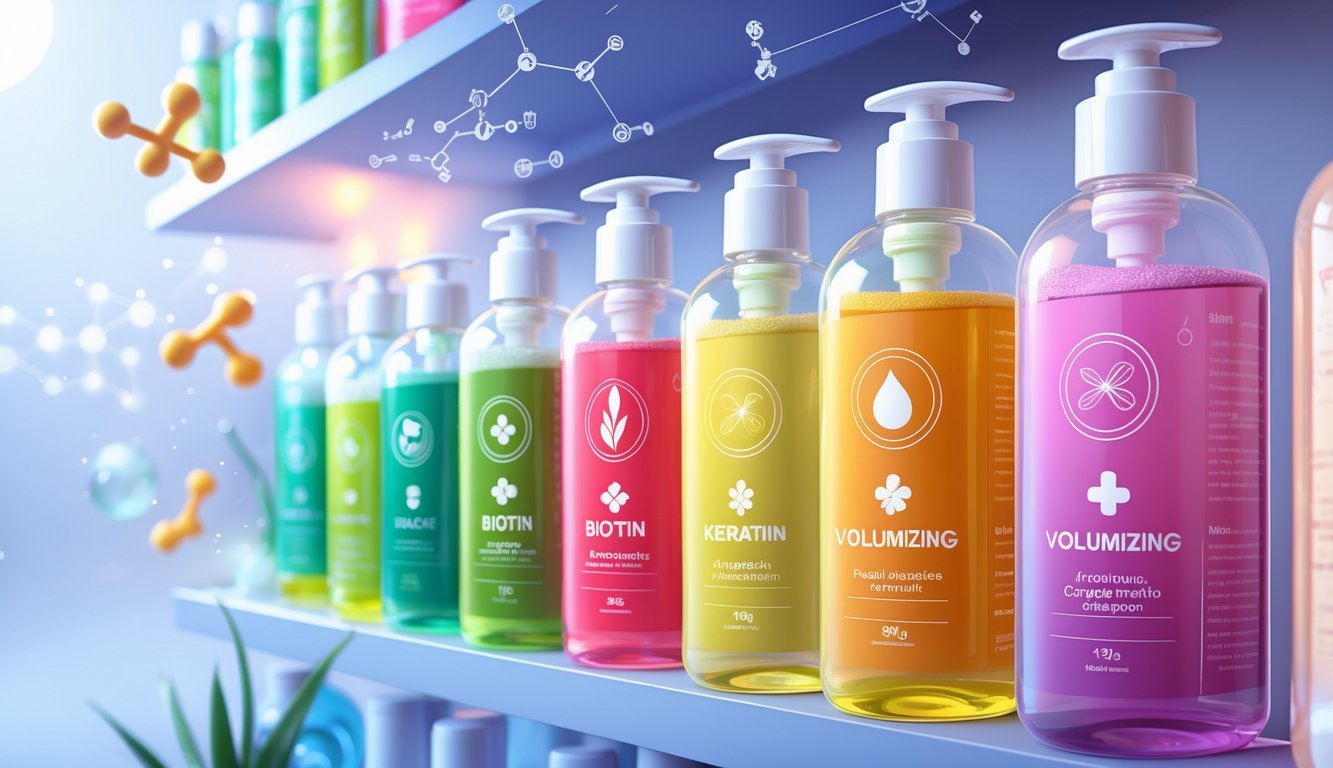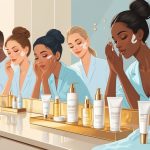Volumizing Shampoo Labels Finally Exposed by Industry Insiders
Ingredients That Might Actually Matter

Half the time, I can’t read the ingredient list—too tiny, too complicated. Is hydrolyzed wheat protein legit, or just marketing? My hairdresser always talks up “film-forming polymers,” but does that even help in humidity? Who knows. Some ingredients work, some just fill up space.
Proteins and Peptides
It’s weirdly satisfying seeing hydrolyzed keratin halfway down the list. I didn’t even know what keratin was until a stylist told me “hair is basically keratin!” So, protein-heavy formulas—wheat, collagen, whatever—sometimes add lift. I read a Stanford trichology paper saying these proteins patch up weak hair, so it swells a bit. Is it just an illusion? Maybe, but sometimes I just want my scalp to look less sad.
Problem: cheap proteins rinse right out unless the formula’s balanced. So if “proteins” are listed high up, it only matters if the rest of the formula isn’t garbage. Oh, and don’t rinse with scalding water unless you want to undo it all.
Copper peptides—whole other story. I saw somewhere (Dermascope? Maybe?) that copper peptides might help with scalp health and maybe thicker hair, but I’ve yet to see enough in a shampoo to matter.
Botanical and “Natural” Stuff
Sunflower seed extract is supposed to protect hair from UV. Does hair even sunburn? I’m skeptical. Chia seed oil and coffee seed oil get more respect from stylists for adding a little “grip” to limp hair, but only if they’re mixed with the right cleansers.
Coconut oil in volumizing shampoos? Almost never—too heavy. Some brands try “nano-emulsions” or whatever, but I’m not buying it. One formulator told me the trick is blending antioxidants with just a touch of oil to fight static, but I never see it done right in the stuff you can actually buy.
Sometimes brands toss in “lavender water” just for the spa vibes. If you want real results, skip it. But hey, more plant extracts and less detergent usually means less scalp irritation. Not more volume, but at least you’re not itchy.
“Advanced” Ingredients (If You Can Call Them That)
Copper peptides pop up sometimes—barely enough to matter. That alpha keratin 60ku thing? I found a whitepaper from 2022 claiming fine hair thickens measurably, but nobody says if it lasts after you stop using the shampoo. Brands love to drop patent numbers like we’re all going to Google them.
Marketing people know we’re onto “film formers.” Light silicones coat hair for a bit of lift after blow-drying, but not the same as conditioner slickness. I’ve argued with stylists about dimethicone vs. polyquaternium—no winner, just opinions. Sometimes, pricier formulas swap in “advanced” actives, so maybe the $20 bottles are worth it if you’re chasing that root-plumping illusion.
Did you know in one industry thread, insiders admit most “volumizing” claims are just clever label wording? I pay attention when I see alpha keratin, copper peptides, or some lab-tested protein complex near the top of the list—at least until some new trend pops up. Next year, it’ll probably be something else.
Harmful and Controversial Ingredients to Avoid
I’m always standing in the aisle, flipping shampoo bottles, squinting at ingredient lists like I’m deciphering ancient runes. Why do half these words look like a chemistry midterm? It’s wild how something “volumizing” can actually just fry your hair in, like, two washes. And don’t even get me started on brands that act like slapping “science” on the label makes their formulas less sketchy.
Sulfates and Harsh Surfactants
Let’s talk about sodium lauryl sulfate. Nobody warned me this stuff would nuke my scalp and leave my hair feeling like straw. Yeah, it foams up like a bubble party, but honestly, who cares about bubbles if your hair’s left flat and crispy? And then there’s sodium coco-sulfate—just because it’s from coconut, am I supposed to feel better about it? Newsflash: my scalp can’t tell the difference, and ClinicAdvisor’s ingredient guide pretty much agrees.
Every dermatologist I’ve ever trusted says ditch sulfates if you have colored, fine, or basically any hair that isn’t made of steel wire. So… everyone? And, weirdly, my hair always looks fuller if I skip sulfates for a day or two. When I switched to shampoos with decyl glucoside or lauryl glucoside, my hair stopped feeling like I’d washed it with dish soap. By the way, DEA, MEA, TEA—those alphabet-soup chemicals? Stylists hate them. They just pile up and make your hair weirdly limp after a while. I don’t get why they’re still around.
Parabens, Fragrance, and Allergens
Parabens. Ugh. Methyl, ethyl, propyl, butyl—whatever. They’re there for shelf life, not for your scalp. I don’t want to sound like a conspiracy theorist, but when the European Commission starts banning stuff, maybe it’s worth listening. If I don’t see “paraben-free” on the bottle, I’m out.
And “fragrance”—I’m convinced it’s just a catch-all for “we don’t want to tell you what’s in here.” Could be two hundred different things, could be three, who knows? I have friends who get migraines from shampoo scents, and I’ve had “fragrance-free” stuff that still made my scalp itch like crazy. If linalool, limonene, or “parfum” is on the list, I’m not buying. Dermatologists seem to agree, and EWG basically says the same thing: skip the fancy-smelling stuff if you value your sanity.
Choosing the Right Volumizing Shampoo for Your Hair Type
Honestly, nothing’s more annoying than dropping cash on some “root-lifting” miracle and ending up with hair that looks… sad. I’ve wasted so much time on products that read like a chemistry set exploded. Stylists even admit it: if you don’t match your shampoo to your hair, you’re just pouring money down the drain.
For Fine, Thin, and Thinning Hair
I’ve tried every “bigger, bolder, thicker” shampoo. Most of them? Total letdown. What actually matters: light, non-greasy formulas. Heavy silicones and oils? Nope. Dermatologists at Byrdie say “lightweight surfactants” are what you want if you don’t want your hair to collapse by noon.
I check for wheat protein, biotin, rice extract—anything that might actually help. Some trichologist told me towel-drying and blow-drying after washing “activates” the volume. I don’t know if that’s science or just hairdresser magic, but it actually seems to help (see Allure’s root lift tips). Oh, and don’t assume the $40 bottle is better—my best volume day came from a random hotel sample. Go figure.
For Color-Treated, Damaged, and Sensitive Hair
Why do so many “volumizing” shampoos also destroy your color? It’s like they want you to suffer. Even the priciest bottles can strip toner or make your hair feel like hay. Luna Viola (celebrity stylist, apparently) told InStyle to only trust gentle, sulfate-free formulas. That’s my rule now. Harsh detergents just undo all your expensive color work.
If it says “rebuilds bonds,” I’m more likely to believe it’s not garbage. Polymers and proteins are good—if your hair’s weak, you need them. For sensitive scalps, niacinamide and oat extract are lifesavers. Not just hype, either; dermatologists back it up. Random tip: rinsing with cool water actually helped my color last, no clue why.
For Oily Hair and Scalps
Greasy roots, dry ends—how is this still a thing? Volumizing shampoos can make it worse if you pick the wrong one. I’ve learned to avoid creamy formulas—they’re loaded with conditioners. Shab Reslan at Byrdie says to stick with lightweight cleansers and gentle clarifiers.
And this whole “wash more often” myth? Doesn’t work for me. Focusing shampoo on my scalp, not the ends, helps stretch out washes. Sometimes peppermint or tea tree oil gives a nice tingle and helps a bit, but honestly, the effect is gone by lunch. Here’s a quick cheat sheet:
| Sneaky Ingredients | Why I Avoid/Choose Them |
|---|---|
| Silicones (Dimethicone) | Makes my hair flat. Hard pass. |
| Sulfates | Can help with oil, but kills color. Meh. |
| Zinc PCA | Actually controls oil, doesn’t gunk up. |
If my scalp’s still greasy after two days, I just switch products. Or threaten to shave my head. (I won’t, but I think about it.) Ingredient sleuthing is exhausting, but it beats guessing.



